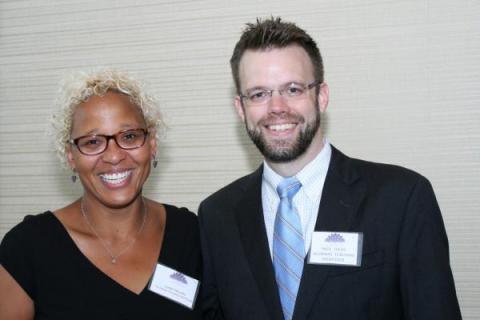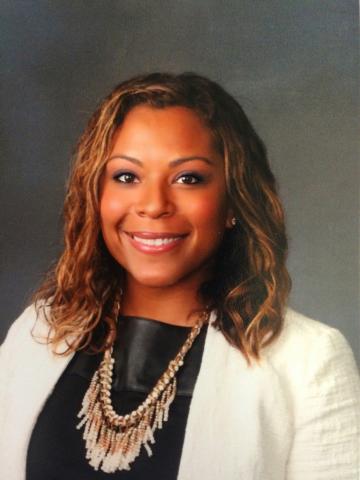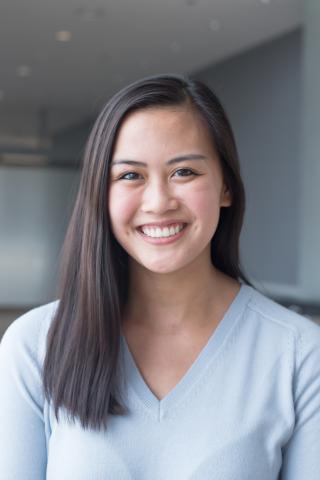Dr. Maria Carrillo, 2018 Alumnae Award recipient and Dr. Teresa Woodruff, Dean of The Graduate School
From The Alumnae of Northwestern University
For Immediate Release: October 26, 2018
Dr. Maria Carrillo to Receive 2018 Alumnae Award
EVANSTON, Ill. --- Dr. Maria Carrillo, Chief Science Officer, Medical and Scientific Relations, Alzheimer’s Association National Office, Chicago, Illinois, is the recipient of The Alumnae of Northwestern University’s 2018 Alumnae Award.
Dr. Maria Carrillo, Chief Science Officer, Medical and Scientific Relations, Alzheimer's Assn. National Office, Chicago, Illinois, receives The Alumnae of Northwestern's 2018 Alumnae Award
Dr. Maria Carrillo, Chief Science Officer, Medical and Scientific Relations, Alzheimer’s Association National Office, Chicago, Illinois, is the recipient of The Alumnae of Northwestern University’s 2018 Alumnae Award.
THE ALUMNAE CELEBRATES 50 YEARS OF ITS CONTINUING EDUCATION PROGRAM
ALL ABOUT THE CELEBRATION - Click on Read more to get the latest information on the 50th. The 50 year history of The Alumnae of Northwestern University's Continuing Education program is available in the attachment on that page.

Nick Davis
Alumnae Teaching Professorship Recipient, 2017

Mira Wang
Graduate Fellowship Recipient, 2018
Mira Wang will receive a B.S. in journalism and global health and a certificate in integrated marketing communication in June, 2018, and will be a member of the first cohort of students selected to pursue a Master’s degree in Northwestern’s Accelerated Public Health Program. She wants to apply her journalism skills to address global problems related to “medicine, politics, economics, and sociocultural” forces and how these forces impact an individual’s health. Mira has particular interest in mental health. She has been an editor of North by Northwestern magazine and has served as an intern at the Midwest Asian Health Association.

Alexzandra Wallace
Graduate Fellowship Recipient, 2018
Alexzandra Wallace graduated with a B.S. in 2009 and is currently (5-2018) in a two-year Masters Program in Learning and Organizational Change in the School of Education and Social Policy. She recognized the early importance of access to quality education and has devoted her career to developing experiential learning opportunities for K-12 students who attend the University of Chicago’s Charter and Laboratory schools. Most notably, she created the Internship for Civic Engagement through a partnership with the University of Chicago’s Office of Civic Engagement. This program emphasizes leadership development for students in the context of community-based learning. Her goal is to “empower students to think critically, problem solve, and become agents of change.”
January 15, 2019 2019 News, Northwestern's School of Education and Social Policy
Read Julie Deardorff's article about Alexzandra Wallace. https://www.sesp.northwestern.edu/news-center/news/2019/01/wallace-receives-alumnae-graduate-fellowship.html

Bailey Kuhn
Graduate Fellowship Recipient, 2018
Bailey Kuhn will receive a B.S. in Biomedical Engineering from McCormick School of Engineering and Applied Science in June and her M.S. in Mechanical Engineering in December 2018. She is president of the Biomedical Engineering Society and volunteers with a club that runs afterschool programs to introduce STEM topics in Spanish in Evanston-area schools. She was nominated for the Cooperative Engineering Education (Co-op) program Student of the Year, was a member of a team that designed a self-lift system, and won first place in the 2017 Mccormick Autonomous Robot Design competition. Even after finished her senior design course, Bailey has continued working to complete a prototype for an infant positioning device that will aid in a particular medical test. She also somehow finds time to be a Northwestern cheerleader!